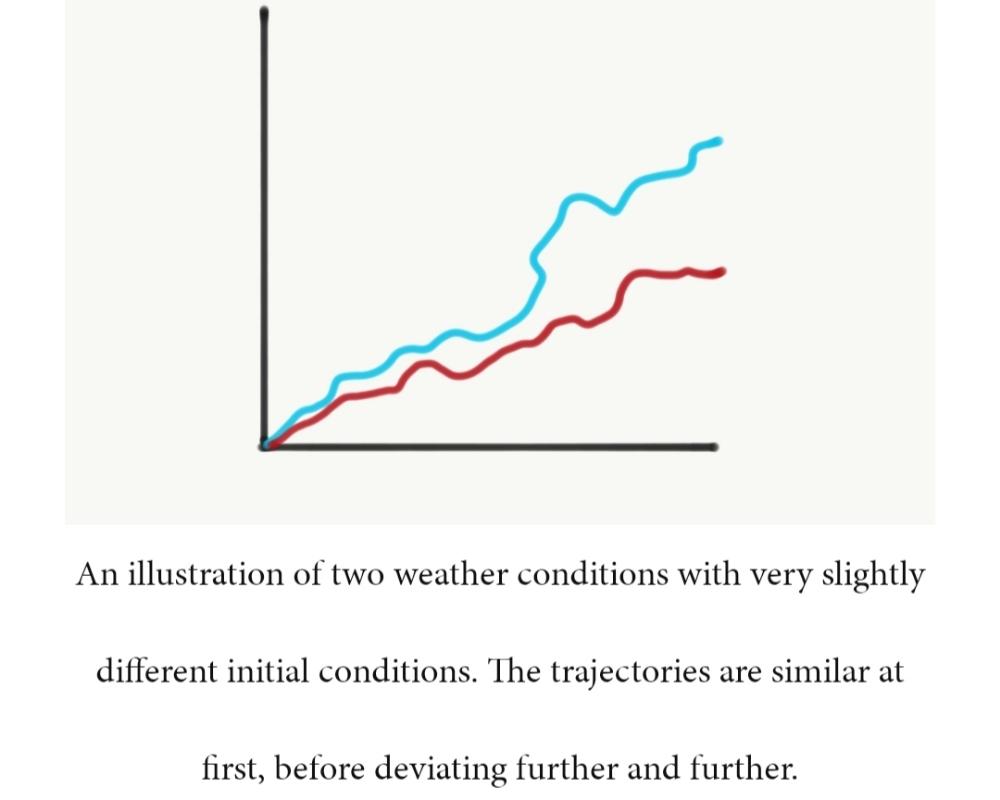The Butterfly Effect.
Curated from: thedecisionlab.com
Ideas, facts & insights covering these topics:
9 ideas
·10.6K reads
96
5
Explore the World's Best Ideas
Join today and uncover 100+ curated journeys from 50+ topics. Unlock access to our mobile app with extensive features.
What Is Exactly The Butterfly Effect
The butterfly effect rests on the notion that the world is deeply interconnected, such that one small occurrence can influence a much larger complex system.
The effect is named after an allegory for chaos theory; it evokes the idea that a small butterfly flapping its wings could, hypothetically, cause a typhoon.
70
1.42K reads
Example
Imagine you bumped into someone at a coffee shop that happens to work at your dream company and eventually got you an interview there.
What if you had chosen a different coffee shop, or been there five minutes later? You may not have met the person that got you into your dream job. The idea that something small, like getting coffee, can have much larger effects, such as altering your career is called the butterfly effect.
66
1.3K reads
“You could not remove a single grain of sand from its place without thereby … changing something throughout all parts of the immeasurable whole.”
FICHTE, THE VOCATION OF MAN (1800)
67
1.52K reads
However
Of course, a single act like the butterfly flapping its wings cannot cause a typhoon.
Small events can, however, serve as catalysts that act on starting conditions.
62
1.22K reads
"Some systems … are very sensitive to their starting conditions, so that a tiny difference in the initial ‘push’ you give them causes a big difference in where they end up, and there is feedback, so that what a system does affects its own behavior.”
JOHN GRIBBIN WRITES IN HIS CULT-CLASSIC WORK DEEP SIMPLICITY
61
1.13K reads
Edward Lorenz and the Discovery of the Butterfly Effect
In an experiment to model a weather prediction, Edward Lorenz ( a meteorologist and a mathematician) entered the initial condition as 0.506, instead of 0.506127.
The result was surprising: a somewhat different prediction. From this, he deduced that the weather must turn on a dime. A tiny change in the initial conditions had enormous long-term implications.
57
1.05K reads
Tiny Changes Can Throw Off Results
He theorized that weather prediction models are inaccurate because knowing the precise starting conditions is impossible, and a tiny change can throw off the result. To make the concept understandable to non-scientific audiences, Lorenz began to use the butterfly analogy.
57
1.01K reads
A butterfly has the potential to create tiny changes
A butterfly has the potential to create tiny changes which, while not creating a typhoon, could alter its trajectory.
A flapping wing represents the minuscule changes in atmospheric pressure, and these changes compound as a model progresses. Given that small, nearly imperceptible changes can have massive implications in complex systems, Lorenz concluded that attempts to predict the weather were impossible.
60
979 reads
It is symbolic representation of an unknowable quantity
he butterfly effect is somewhat humbling—a model that exposes the flaws in other models. It shows science to be less accurate than we assume, as we have no means of making accurate predictions due to the exponential growth of errors.
63
1.01K reads
IDEAS CURATED BY
Dental Student🦷 An aspiring Doctor striving towards the path of righteousness.⚕
CURATOR'S NOTE
The butterfly effect is an often misunderstood phenomenon wherein a small change in starting conditions can lead to vastly different outcomes. Understanding the butterfly effect can give us a new lens through which to view business, markets, and more.
“
Syed Princy's ideas are part of this journey:
Learn more about sciencefiction with this collection
How to choose the right music for different tasks
The benefits of listening to music while working
How music affects productivity
Related collections
Similar ideas
4 ideas
7 ideas
Explainer: what is Chaos Theory?
theconversation.com
5 ideas
The Cobra Effect
nesslabs.com
Read & Learn
20x Faster
without
deepstash
with
deepstash
with
deepstash
Personalized microlearning
—
100+ Learning Journeys
—
Access to 200,000+ ideas
—
Access to the mobile app
—
Unlimited idea saving
—
—
Unlimited history
—
—
Unlimited listening to ideas
—
—
Downloading & offline access
—
—
Supercharge your mind with one idea per day
Enter your email and spend 1 minute every day to learn something new.
I agree to receive email updates







